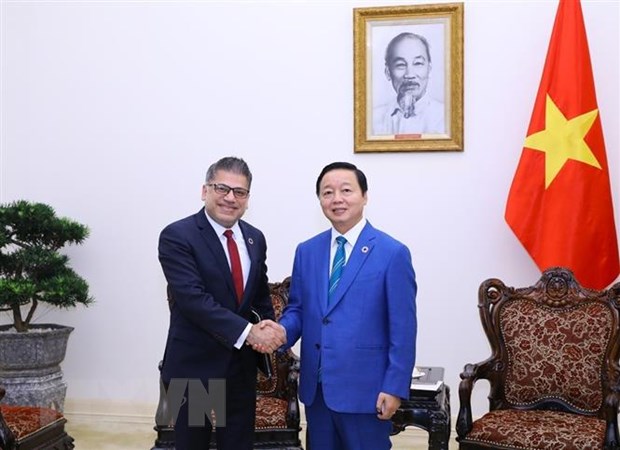Vietnam strengthens cooperation in vaccines and biologics for disease prevention
The world can only push back and stop diseases if all countries have equal access to vaccines.
Vietnam is always willing to cooperate with AstraZeneca, especially in the field of vaccines and biologics, to proactively prepare for disease prevention and control in the future.
Deputy Prime Minister Tran Hong Ha made the statement at the meeting with Nitin Kapoor, Chairman and General Director of AstraZeneca Vietnam on August 14 in Hanoi.
The Deputy Prime Minister thanked AstraZeneca for providing valuable and timely support to Vietnam in preventing and controlling the Covid-19 pandemic, contributing to global efforts to combat the disease.
Ha emphasized that the world can only roll back and stop the pandemic if all countries have equal access to vaccines. Similarly, the goals of responding to climate change and reducing greenhouse gas emissions cannot be achieved if some countries are left behind.
Deputy Prime Minister Tran Hong Ha (R) and Nitin Kapoor, Chairman and Managing Director of AstraZeneca Vietnam, at a meeting in Hanoi on August 14. Photo: VNA |
Noting that human health is closely linked to the "health" of the environment, the official affirmed that restoring and protecting the natural environment is an important solution to prevent and reduce the burden of disease associated with water, air and waste pollution.
"Technology is the "vaccine" to respond to climate change. Developing countries like Vietnam urgently need support and access to various solutions to reduce greenhouse gas emissions," Ha said.
He added that companies with strong scientific research capabilities, such as AstraZeneca, have an important role in achieving climate change goals, such as cutting greenhouse gas emissions to as close to zero as possible, building smart transmission systems and high-capacity energy storage.
Nitin Kapoor reported on a number of collaborative programs and projects that have been implemented in Vietnam to improve patient access to medicines, develop a sustainable healthcare system, improve public health, and research clinical trials for drugs and biologics.
Reporting on a number of commitments to reduce emissions and move towards zero carbon, Nitin Kapoor said AstraZeneca is actively working with Vietnamese agencies and partners to implement the US$50 million Afforestation and Landscape Restoration Project. The move aims to plant 22.5 million trees on 30,500 hectares, creating conditions for biodiversity development and sustainable livelihoods for more than 17,000 households.
Aware of the strong links between climate change, pollution and human health, Mr. Kapoor hoped that the Vietnam Afforestation and Landscape Restoration Project would be a pilot project in the National Steering Committee's Action Plan to implement Vietnam's commitments made at the 26th Conference of the Parties to the United Nations Framework Convention on Climate Change (COP26). Through the action, he hoped it could spread and encourage other organizations and businesses to act together in response to climate change.











